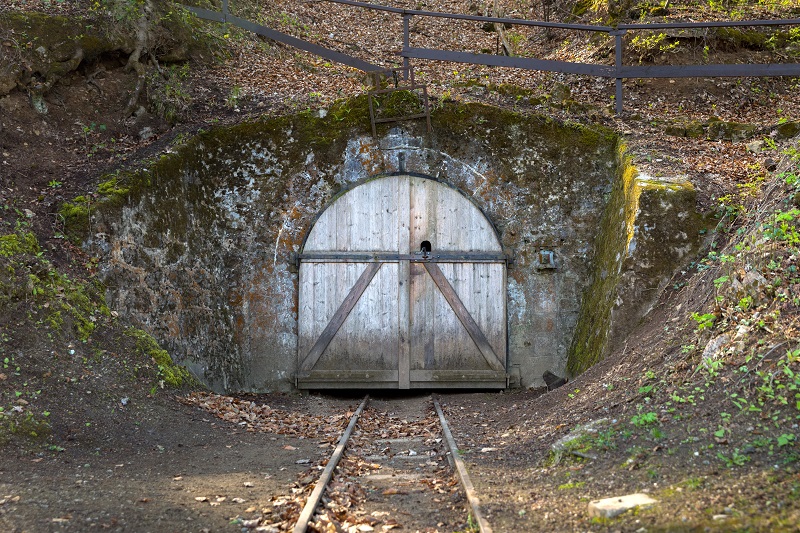Legends & Ghost Stories
The following stories all come from North Carolina Legends by Richard Walser. This book is available from:
Historical Publications Section
Division of Archives and History
109 E. Jones Street
Raleigh, NC 27601-2816
919-733-7442.
We greatly appreciate their generosity in allowing us to reprint these stories.
The Ship of Fire
On a certain evening every year, at the mouth of the wide Neuse River, a large bright object speeds into view. It looks like a sailing ship being destroyed by fire, its deck and masts in blazing outline. The apparition disappears, then reappears, then again disappears for another year. It burns furiously but is not consumed.
It is the ship of the Palatines. The Palatines were a group of German Protestants who left England in 1710 to settle New Bern. As the vessel crossed the Atlantic, the prosperous Palatines, pretending to be poor, hid their gold coins and silver dishes from the eyes of the ship's sinister captain and crew. When the Palatines caught sight of the shore which they believed to be their future home, so excited were they that up from the hold and out from hiding places came all their belongings in preparation for landing. Unwisely displayed on the deck was their precious wealth, all of it in full view of the corrupt captain and his first mate.
Quickly the captain formed a plan. He announced to the passengers than no landing could be made until the morrow. The disappointed Palatines once more hid their valuables and lay down to a sound sleep in anticipation of soon landing at their destination. When all was quiet, the captain gathered his crew together and revealed to them his plan. They would murder every Palatine aboard--the young and the old, the women and children as well as the men--then gather together the gold and silver, set afire the ship filled with its dead, and escape in the lifeboats.
The strike was sudden. Many Palatines were knifed before they awoke and in a very few moments every one of them was dead. As planned, the ship was set afire, and the murderers pushed off in the small boats. From a distance they looked back at the ship. It burned brighter and brighter, the brilliant blaze of the fire shooting into the air, but the vessel did not sink into the water. And then the thing began to move.
"It continued to burn all night," according to an old account, "--speeding on with the wind,--now passing out from sight, and anon, visible, flaming forever, back again, on the very spot where the crime had been committed. With the dawn of day, it had ceased to burn,--but there it stood, erect as ever, with the spars, sails, masts, unconsumed,--everything in place, but everything blackened, charred." At sundown the flames leaped up again--"a ship on fire that would not burn!"
The frightened murderers could bear no more. They abandoned their boats on the bank of the river and fled into the forest. There they and their descendants lived on their "ill-gotten spoils." To this day the crime has not been avenged, and so every year on a certain evening the burning ship appears off New Bern, and so it will continue to appear till the blood of the Palatines has been paid for in kind.
The Devil's Tramping Ground
In a wooded area in western Chatham County, ten miles east of Siler City, is a well-worn path that forms a ring forty feet in diameter. The path itself is a foot wide. The center of the circle and the ground outside the path are lush with grass and other plant life, but nothing grows in the foot-wide track. At sunset, when rocks or similar heavy objects are placed in the pathway, they are found the next morning to have been brushed aside. In fall and winter, when rabbit hunters roam the surrounding countryside, their dogs perform joyously until the chase nears the barren circle. Then the dogs tuck their tail between their legs and slink away. They will not go near the spot.
Soon after the first settlers came to Chatham County, they discovered the strange site, which soon became known as the Devil's Tramping Ground. This was before 1800.
Though no one ever saw him stalking there, it was believed to be the haunt of the Foul Fiend, who came at night to tramp around and around and around in a circle, his head lowered, his expression intense. It was during these hours that Satan planned his evil schemes to undo mankind. At the first light of morning he was gone, winging his way like a bat across the world to carry out his nefarious purposes. Yet so scorching had been his footprints on the ground of his circular pathway that the soil became infertile, and the nocturnal retreat of the hellish Prince of Darkness was shunned and avoided.
A Speech for Buncombe
From 1817 to 1823, western North Carolina, including the proud county of Buncombe, sent Felix Walker to the House of Representatives in Washington. He was a glib and garrulous talker, and doubtless it was his very trivial and high-sounding speeches that found favor with the word-loving mountain voters of the day.
On February 25, 1820, during the congressional debate on the Missouri Compromise, Walker signaled that he wished to make a speech. But so protracted had been the debate and so weary were the members of the House that a colleague told Walker that no one wished to hear him at that time. The persistent fellow said that he would take only a few moments, for he wished merely a chance to get his speech reported in the newspapers and in that way provide his constituents with solid evidence that he was doing a good job in Washington. "I shall not be speaking to the House," he confessed, "but to Buncombe."
But in the chambers of the House, "the question was called for so clamorously and so perseveringly that Mr. W. could proceed no farther than to move that the Committee rise," which it refused to do. When later the representative delivered his oration and had it printed in the newspaper, it was agreed that truly it was a speech for Buncombe, meaning that it was frivolous, repetitious, and unnecessary.
Felix Walker was not downcast. He had done the thing he needed to do, and that was that. Came the comment: "Walker's speech was buncombe--no doubt about it."
The word caught on. Eventually it was spelled bunkum, meaning any nonsensical language, then shortened to bunk. In such a way did a beautiful mountain county in North Carolina add a new a useful word to the English dictionary.
Specter at the Gold Mine
During the Carolina gold rush of the 1830s and 1840s, a miserly old codger called Skinflint McIntosh owned a rich vein in southern Cabarrus County. So tightfisted was he that he wouldn't pay adequate wages to the miners to dig for the gold, nor would he provide sufficient safety measures to prevent accidents in his mine. The vein of gold was 450 feet down a narrow shaft.
One of the best workers in the district was Joe McGee, whom Skinflint kept trying to hire. "If I got killed down there," said Joe, "would you pay my wife Jennie $1,000?" "Joe," Skinflint shouted, "I'd pay her $2,000." And so it was that Joe gave up his other job and went to work for Skinflint.
One cold, drizzly night, when Joe didn't come home at the usual hour, Jennie became worried. Finally she persuaded Joe's friend Shaun to gather up a few men and look for Joe in the mine. They search the deep hole but found nothing. After several weeks Jennie asked Skinflint for her money. "Oh, no," said Skinflint, "Joe's just gone off somewhere." And he didn't pay her.
Soon after, on another bitter night, a loud knock came on Shaun's door. Opening it, he was startled by a ghostly white specter who spoke with the voice of his friend Joe and told Shaun to go to the mine that very night; it told him to dig a certain spot where the green timbers had given away and caused a cave-in. It asked if Skinflint had paid Jennie, and when Shaun said no, the specter wailed, "I'll haunt that mine of his forever."
McGee's body was found exactly where the specter said. Skinflint paid up, but only when threatened by Joe's old friends. Word spread about the haunted mine, and no one would work for McIntosh. All of this happened 150 years ago but the gold is still in the mine--as is the specter of Joe McGee.
Brown Mountain Lights
As mountains go, low-lying Brown Mountain in Burke County is not impressive. Yet it is one of the most famous mountains in North Carolina. On certain evenings soon after dark, when observed from the eminence of Linville or Wiseman's Gap, small but brilliant lights can be seen on it, bobbing up and down for a minute or so, then disappearing, then reappearing in another place until finally they are gone. They were first seen about 1850 long before the day of trains and electricity and automobiles.
One legend tells of a girl who lived on the mountain with her father. Every night her sweetheart came from the village to see her, tramping through a forest of snakes and vicious animals. On the evening when he was to take her away to be married, she lighted a pine torch and went out to welcome him. He never came. But from then on, at sunset, she raised her flaming torch and darted from here to there on the mountain, hoping to come upon him. After her death the light of her torch still could be seen on stormy nights.
Another legend concerns a wicked man named Jim, whose sweet-tempered young wife Belinda was to have a child. Jim was courting Susie and began to speak harsh words and be cruel to Belinda. One day neighbors noticed that they had not seen Belinda for some while. Jim said she had gone to visit her kinfolk, but the neighbors were suspicious when they discovered bloodstains on the floor of the mountain cabin. Their suspicions were further heightened when an indigent stranger drove away with Jim's horse and wagon. They believed the stranger had helped Jim kill and bury Belinda, and Jim was paying him off in this way. Soon afterward the lights appeared, bobbing up and down, seemingly to guide searchers looking for Belinda. Finally, under a pile of stones in a deep ravine they found the skulls of a woman and a baby. Jim left the county and was never heard of again, but the lights stayed on, reminding evildoers that their crimes will be revealed.
Apart from the legends, scientists have provided many explanations for the mysterious Brown Mountain Lights, none of them satisfactory.
Maco Light
On a night in 1867, at the small Brunswick County station of Maco fifteen miles west of Wilmington, a slow freight train was puffing down the track. In the caboose was Joe Baldwin, the flagman. A jerking noise startled him, and he was aware that his caboose had become uncoupled from the rest of the train, which went heedlessly on its way. As the caboose slackened speed, Joe looked up and saw the beaming light of a fast passenger train bearing down upon him. Grabbing his lantern, he waved it frantically to warn the oncoming engineer of the imminent danger. It was too late. At a trestle over the swamp, the passenger train plowed into the caboose. Joe was decapitated: his head flew into the swamp on one side of the track, his lantern on the other. It was days before the destruction caused by the wreck was cleared away. And when Joe's head could not be found, his body was buried without it.
Thereafter on misty nights, Joe's headless ghost appeared at Maco, a lantern in its hand. Anyone standing at the trestle first saw an indistinct flicker moving up and down, back and forth. Then the beam swiftly moved forward, growing brighter and brighter as it neared the trestle. About fifty feet away it burst into a brilliant, burning radiance. After that, it dimmed, backed away down the track, and disappeared.
It was Joe with his lantern, of course. But what was he doing? Was he looking for his head? Or was he trying to signal an approaching train?
In 1889 President Grover Cleveland, on a political campaign, saw the mysterious light, as have hundreds of people throughout the years. But in 1977 when the railroad tracks were removed and the swamp reclaimed his haunting grounds, Joe seems to have lost interest in Maco. At least, he has not been seen there lately.
Girl at the Underpass
Not long ago, but before interstate highways ran around towns and cities, a young man left Greensboro late one night to drive to his old home in Lexington. At that time, just east of Jamestown, the old road dipped through a tunnel under the train tracks. The young man knew the road well, but it was a thick foggy night in early summer and he drove cautiously, especially when he neared the Jamestown underpass. Many wrecks had taken place at that spot. He slowed down on the curve leading to the tunnel and was halfway through it when his eyes almost popped out of his head. Standing on the roadside just beyond the underpass was an indistinct white figure with arm raised in a gesture of distress. The young man quickly slammed on his brakes and came to a stop beside the figure.
It was a girl, young, beautiful, resplendent in a long white evening dress. Her troubled eyes were glaring straight toward him. Obviously she was in need. He jumped from the car and ran around to where she stood motionless. "Can I help you?"
"yes." Her voice was low, stranger. I want to go home. I live in High Point."
He opened the door, and she got in. As they drove off, he said, "I'm glad I came by. I didn't expect to find anyone like you on the road so late at night."
"I was at a dance." She spoke in a monotone. "My date and I had a quarrel. It was very bad. I made him drop me back there."
He tried to continue the conversation, but she would say nothing more until they were into High Point. "Turn at the next left," she said. "I live three doors on the right." He parked before a darkened house, got out of the car and went around to open the door for her. There was no one there! He looked into the back seat. No one! He thought she might have rushed up the sidewalk and out of sight.
Confused and undecided about what to do next, he thought it only reasonable to find out if she had entered the house. He went up the steps and knocked on the door. No one came. He knocked again. There was no sound anywhere. After a third knock, through the side panes a dim light appeared from the pitch-black hallway. Finally the door was opened by a white-haired woman in a night robe.
"I brought a girl to this house," he explained, "but now I can't find her. Have you seen her? I picked her up out on the highway."
"Where?"
"At the Jamestown underpass. She told me she had been to a dance and was on her way home."
"Yes, I know," said the woman wearily. "that was my daughter. She was killed in a wreck at that tunnel five years ago tonight. And every year since, on this very night, she signals a young man like you to pick her up. She is still trying to get home."
The young man turned from the doorway, speechless. The dim light in the house went out. He drove on to Lexington, but never has he forgotten, nor will he ever forget, the beautiful hitchhiker and how she vanished into the night.







